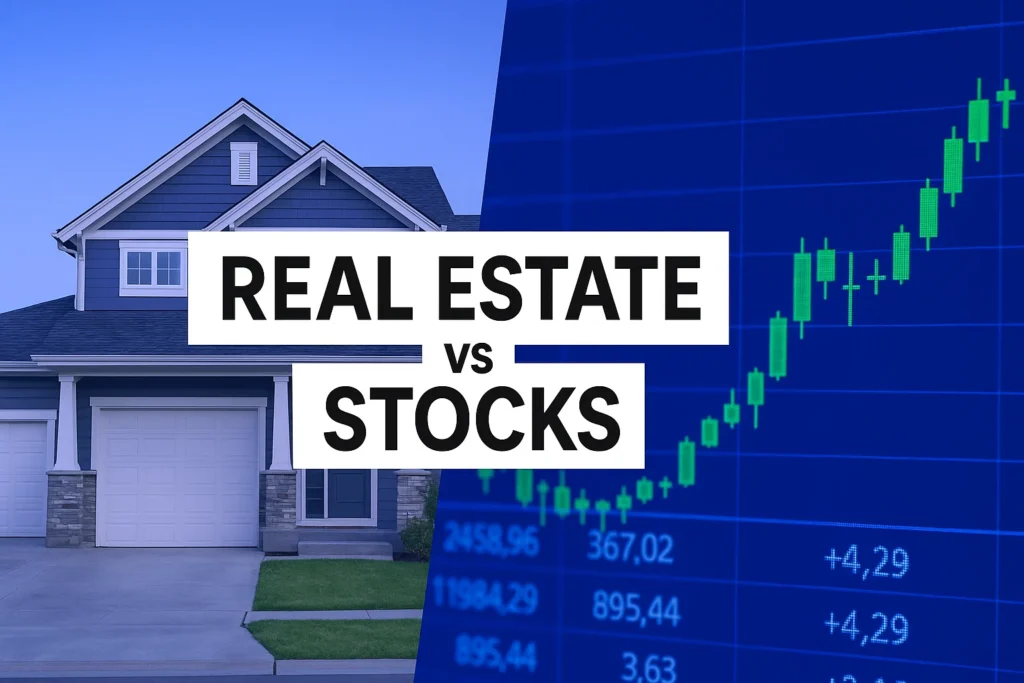
Table of Contents
You’re not the only one second-guessing where to put your money in 2025. Some days, real estate feels like the safe bet—tangible, solid, something you can touch.
Other days, stocks look like the faster route to wealth, especially when headlines scream about record highs. But the truth is, both can make you rich, and both can wipe you out.
I’ve seen people with rental properties drowning in debt while their friends cashed out six figures from stocks. I’ve also witnessed stock traders losing all their money in an instant, while real estate investors consistently collected rent.
So, when you ask, “Real estate vs. stocks, which is better?” You need to understand that both investments have their pros and cons. That’s why today I’m going to share insider lessons about which investment is the best, insights that you won’t hear in a seminar.
Overview: Real Estate vs Stocks
The difference between real estate and stocks, and why investing in stocks seems more appealing than the other, is that it doesn’t require a lot of money or as much time as real estate to get returns.
If you’re investing in real estate, you’ll need to invest a substantial amount of money, and there are other factors to consider when investing in real estate, which can be overwhelming for a beginner.
But there’s an alternative and easier option to investing in real estate if you don’t feel like building a rental property or buying a landed property, and that is investing in REITs (Real Estate Investment Trusts).
This type of investment allows you to own shares in a wide range of income-producing real estate properties, like shopping malls, apartment complexes, hotels, offices, and warehouses, without having to buy, manage, or finance the properties yourself.
Whereas stock investment involves buying a share or equity of a company, waiting for those shares to appreciate, and collecting dividends from the company.
So, investing in either of the two comes down to how much you can invest, your risk tolerance, goals, and investment style.
Real Estate vs Stocks: Which One Makes More Money?
Comparing which investment makes the most money depends on which stocks or which real estate you pick, and a variety of factors like prices, value, and the amount invested. However, from research, there’s an idea of the returns on each investment per year.
The average annual return on stocks according to the S&P 500 Index is about 10.39% annually. Although in some years the returns are higher, in other years the returns may be lower.
Whereas from 1992 to 2019, Real Estate Investment Trusts (REITs) have had an average annual return of 11.1%. This doesn’t mean real estate performs better than stocks; in fact, comparing the returns from real estate and stock investments is unreasonable because there are several factors that affect it, and the results will always vary.
That said, real estate can work if you’re willing to be active, have substantial capital, and pick the right markets. But if you want the simplest path to building wealth with the least effort, stocks have the better track record.
But it’s a lot more beneficial when you invest in both for diversification and tax benefits than when you invest in one or the other.
Real Estate vs Stocks: Pros and Cons
Pros and Cons of Real Estate
Owning a property can grow your wealth with predictable income and other advantages, but there are some disadvantages that you need to understand and carefully plan for before investing in real estate.
Pros:
1. You get control of your investment
Real estate is a tangible asset that provides better control over your investments compared to stocks.
You can actively increase its value and income. You can renovate, raise rent, cut costs, refinance, or change how you use the property.
Those decisions directly affect your returns. With stocks, you have zero control. You can only buy, hold, or sell. The company and the market decide how much you get in return, not you.
2. You can invest in debt
You don’t need to pay the full price of a property to own it. You can put down a payment of 20% and use a mortgage (the bank’s money) to buy the property. Now, if that house or property appreciates, you can resell to magnify your gains.
You can rent it out or use it as an Airbnb to boost cash flow and returns, even if the property value drops.
3. You enjoy tax benefits
With real estate investment, you get tax breaks that let you keep more of your rental income.
Instead of paying tax on the full income/amount you receive, you subtract expenses like repairs, insurance, depreciation, and mortgage interest.
You’re only taxed on what’s left, which is your taxable income. And if you have a mortgage, the interest deduction usually lowers your taxes even further.
4. It serves as a hedge against inflation
When prices of goods and services go up, property values and rents usually rise too, making real estate an inflation hedge.
If inflation makes building materials, labor, and land more expensive, the value of your property tends to appreciate. At the same time, you can raise rents to keep up with the higher cost of living.
So while inflation eats away at the value of cash sitting in your bank account, real estate often grows in value and generates higher rental income.
Cons:
1. It requires a high upfront investment
Investing in real estate often requires a heavy upfront investment. Between the down payment, closing costs, and repairs, you may need a down payment of tens of thousands before you ever see a dollar back. This makes it harder to get started compared to stocks, where you can invest with just a few hundred.
2. It is highly illiquid
If you own a rental property and suddenly need money, you can’t just “sell a piece of it” like you would with stocks. It can take months or even years to sell a property, as numerous processes are involved.
Even if you try to sell fast, you might need to drop the price, which can cost you ROI. But with stocks, you can just sell or buy stocks with just a click.
Pros and Cons of Investing in Stocks
While stock investment may require lower upfront investment, there are some significant downsides to it. Below are the pros and cons of investing in stocks.
Pros:
1. Low barrier to entry
You can buy shares with as little as a few dollars, and many platforms even let you purchase fractional shares (a piece of a stock instead of the whole thing). That means you could own part of Apple or Tesla for $10 instead of paying hundreds for a full share.
Compared to real estate, which usually demands tens of thousands upfront, stocks make it easy for almost anyone to begin investing.
2. Easy diversification
With just a few hundred dollars, you can spread your money across different companies, industries, and even countries.
You can also buy ETFs or index funds, which give you exposure to dozens or hundreds of stocks in one move.
In real estate, diversification takes a lot more cash. You’d need multiple properties in different locations, which is expensive and harder to manage.
3. Highly liquid
Unlike real estate, where selling can take months or years, you can buy or sell shares almost instantly during market hours with just a click.
You can also withdraw your investments within a couple of days, sometimes even sooner, with modern brokers.
It is also easier to see the appreciation or depreciation of your investment at any time, so you can make decisions about whether to opt out, which is not the same for real estate.
4. Passive Investment
You don’t have to actively manage your stock investment once you’ve bought in. Unlike real estate, when you own a rental property, you deal with tenants calling about broken pipes, repairs, late payments, or hiring a property manager to do it for you.
With stocks, you buy shares, and your part is done. If the company pays dividends, the money just lands in your account. If you’re in index funds, they automatically spread your money across hundreds of companies without you lifting a finger.
Cons:
1. No control of your investment
Unlike real estate, you have no control over your investments when you invest in stocks. When you buy shares, you’re just a partial owner on paper. You don’t decide business strategy, pricing, hiring, or management moves.
If the CEO makes bad calls or the market moves against you, your investment gets affected, and you can’t do anything to stop it.
Even if you own thousands of shares, unless you’re a majority shareholder, you can’t change company decisions or cause the market to work in your favor. Your only real choice is to hold, buy more, or sell.
2. It is volatile
Prices can fluctuate in minutes based on news, earnings reports, interest rate changes, or even market rumors.
This price volatility can provide huge returns, but it can also cause sudden losses—and you have no control over the market and price changes.
3. It triggers emotional trading
The fluctuation of prices can trigger emotional trading in stock investing. There’s a constant cycle of fear and greed that pushes many investors to make rash decisions, and this emotional rollercoaster is a real con of stock investing.
Unlike real estate, where values move slowly, stocks can change by the second—and that tests your discipline.
Conclusion
So the debate on which investment is the best depends on you and what your goals are. If you want full control over your investment, steady income, and tax relief, real estate is the best choice.
If you want liquidity, an investment with less capital, and compounding returns, stocks work. However, the best decision you can make in 2025 is to invest in both and diversify. That way, your money works in every market.
FAQs on Real Estate vs Stocks
Is real estate more profitable than stocks long term?
Both real estate and stocks can be profitable long-term. Real estate offers steady cash flow, while stocks deliver faster growth but with greater volatility that can come with huge gains but also huge losses. And as mentioned earlier, the profitability of either of the investments depends on the market conditions, your investment style, and the amount invested.
Why do people prefer real estate over stocks?
Real estate is tangible, generates passive rental income, and offers tax breaks. That’s why it’s appealing to many, and also, it feels more controllable than stocks, which are highly volatile.
Can you lose money in real estate the way you do in stocks?
Yes, you can lose money in real estate through vacancies, falling property values, or poor property management, but its losses are often slower compared to stocks due to its market volatility.
What is the safest way to start investing with little money?
The safest start is low-cost index funds or REITs. Both require small amounts, spread risk across assets, and let you build wealth without heavy upfront costs or complex management.
Should I diversify between real estate and stocks?
Diversifying between real estate and stocks can lower risks and help grow your wealth. It is preferable to invest in both, as real estate can buffer your investment against inflation and add cash flow, while stocks provide long-term growth and liquidity. Together, they hedge your risks.



